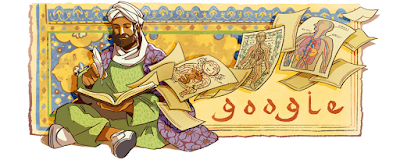Tuesday, August 7, 2018
Ibn Sina’s 1038th Birthday
One of the pre-modern world’s most influential philosophers, Ibn Sina (sometimes known as “Avicenna” in the West) was born in the year 980, during what’s now known as the Islamic Golden Age.
Ibn Sina grew up in Afšana, a village near Bukhara, near present-day Uzbekistan. A self-taught polymath, Ibn Sina learned Indian arithmetic from an Indian grocer. He continued to pursue learning throughout his life, undertaking an intense study of Aristotle’s Metaphysics when he was in his teens, and studying medicine from the age of 16 (reportedly finding this subject “easy”).
A writer in a wide range of fields, Ibn Sina authored 131 books, the most influential of which is the monumental Al Qanun fil-Tibb, ‘The Canon of Medicine.’ This pioneering study was translated into Latin in the 12th century, and became the predominant text used in European medical courses until the 17th century. The first work to identify contagious diseases such as tuberculosis, to hypothesize that soil and water spread sickness, and to set forth the basics of anatomy, pediatrics, and gynecology, the ‘Canon’ is now credited as forming the basis of Western medicine.
Today’s Doodle celebrates Ibn Sina: a life devoted to education and the spirit of learning for the betterment of humankind.
07.08.2018-1-Tuesday-செவ்வாய்-Doodle by Cynthia Yuan Cheng-Ibn Sina’s 1038th Birthday-PNG.
07.08.2018-2-Tuesday-செவ்வாய்-Doodle by Cynthia Yuan Cheng-Early Concept _ 1 _ of the Doodle-Ibn Sina’s 1038th Birthday-JPEG.
07.08.2018-3-Tuesday-செவ்வாய்-Doodle by Cynthia Yuan Cheng-Early Concept _ 2 _ of the Doodle-Ibn Sina’s 1038th Birthday-JPEG.
07.08.2018-4-Tuesday-செவ்வாய்-Doodle by Cynthia Yuan Cheng-Early Concept _ 3 _ of the Doodle-Ibn Sina’s 1038th Birthday-JPEG.
Labels:
2018,
Birthday,
Cynthia Yuan Cheng,
Doodle,
Early concept,
Ibn Sina,
jpeg,
PNG
Subscribe to:
Post Comments (Atom)





One of the pre-modern world’s most influential philosophers, Ibn Sina (sometimes known as “Avicenna” in the West) was born in the year 980, during what’s now known as the Islamic Golden Age.
ReplyDeleteIbn Sina grew up in Afšana, a village near Bukhara, near present-day Uzbekistan. A self-taught polymath, Ibn Sina learned Indian arithmetic from an Indian grocer. He continued to pursue learning throughout his life, undertaking an intense study of Aristotle’s Metaphysics when he was in his teens, and studying medicine from the age of 16 (reportedly finding this subject “easy”).
A writer in a wide range of fields, Ibn Sina authored 131 books, the most influential of which is the monumental Al Qanun fil-Tibb, ‘The Canon of Medicine.’ This pioneering study was translated into Latin in the 12th century, and became the predominant text used in European medical courses until the 17th century. The first work to identify contagious diseases such as tuberculosis, to hypothesize that soil and water spread sickness, and to set forth the basics of anatomy, pediatrics, and gynecology, the ‘Canon’ is now credited as forming the basis of Western medicine.
Today’s Doodle celebrates Ibn Sina: a life devoted to education and the spirit of learning for the betterment of humankind.
Doodle by Cynthia Yuan Cheng.